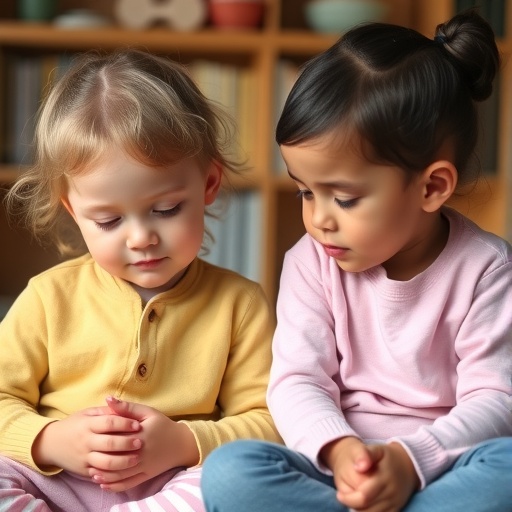In a groundbreaking study published in “Journal of Child and Family Studies,” researchers conducted a comprehensive randomized controlled trial comparing mindfulness training for parents and children to traditional medication for addressing mental health issues in young families. This trial, known as MYmind, represents a significant advancement in understanding the impact of mindfulness practices as therapeutic alternatives.
Many children and adolescents globally face challenges such as anxiety, depression, and behavioral problems. Conventional approaches typically involve prescribed medication to alleviate these symptoms, which can lead to concerns about dependency and side effects. Researchers are increasingly advocating for alternative interventions that can be integrated into family life, thus promoting a holistic approach to mental wellness. This study specifically highlights the potential of mindfulness as a viable option for improving emotional regulation and overall mental health.
The MYmind program focuses on training both parents and children in mindfulness practices, enabling families to develop essential skills together. Mindfulness, characterized by heightened awareness of thoughts, feelings, and surroundings, offers a solid foundation for emotional regulation, empathy that can potentially enhance family dynamics. Studies have shown that families who practice mindfulness together experience lower levels of stress and improved communication, suggesting that the benefits extend beyond individual participants.
The randomized controlled trial included a diverse sample of families, with participants being assigned to either the MYmind program or a medication intervention. This rigorous methodology underscores the study’s validity, providing a robust framework for assessing the efficacy of mindfulness training compared to medication. Participants were evaluated at multiple points throughout the study, allowing researchers to analyze both immediate and lasting effects of the interventions on mental health and well-being.
Researchers utilized a variety of measurement tools to capture the impacts of these interventions. Surveys were administered to assess levels of anxiety and depression in both children and parents, alongside observations of family interactions. Data was meticulously analyzed to determine the effectiveness of the MYmind program compared to the medication. This multi-dimensional approach not only assessed personal wellbeing but also the relational dynamics within families.
The results of this study have profound implications for mental health treatment protocols. With many parents expressing dissatisfaction with medication as the primary route for treating childhood mental health issues, there is an escalating interest in holistic, preventive strategies that can be implemented alongside or in lieu of pharmacological solutions. The study provides evidence supporting the integration of mindfulness training into existing mental health care frameworks.
Moreover, the findings suggest that mindfulness training may lead to substantial reductions in anxiety and behavioral issues. The combination of parent and child involvement in the program emphasizes the role of family support as a crucial element in achieving mental health improvements. This underscores the importance of involving families in treatment plans rather than isolating individuals in their healing journeys.
Despite the promising outcomes of MYmind, the study acknowledges factors that could influence its overall effectiveness. Variability in family dynamics, preexisting relationships, and prior exposure to mindfulness practices may all play a role in the outcomes observed. Thus, while the data shows promising trends, the applicability and effectiveness of mindfulness training may differ across diverse family units and contextual backgrounds.
As awareness of mental health issues continues to grow, the demand for alternative treatment options is on the rise. This research points toward mindfulness as a powerful tool that not only aids those struggling with mental health concerns but also fosters stronger family bonds and cohesive dynamics. The potential for mindfulness to serve as a preventative measure could revolutionize mental health practices in pediatric settings.
Looking ahead, it will be essential for further research to investigate the long-term impacts of the MYmind program. Longitudinal studies will help ascertain whether the positive outcomes reported persist over time and if families who have undergone mindfulness training continue to reap benefits as their children grow. Additionally, exploring factors that facilitate or hinder the adoption of mindfulness practices in everyday family life will provide valuable insights for practitioners and policymakers alike.
The MYmind program represents an exciting frontier in childhood mental health treatment, combining empirical research with practical application. As families navigate the complexities of mental wellness, the incorporation of mindfulness may offer not only relief from symptoms but also a path toward more meaningful connections and heightened emotional resilience.
Collectively, this study echoes a broader societal shift toward mindfulness and its role in contemporary wellness. As more families commit to integrating mindfulness practices into their daily routines, the potential for transformational change in mental health treatment becomes increasingly apparent. By sharing this research, we hope to inspire others to explore mindfulness not just as a therapeutic intervention but as a lifestyle choice that promotes overall well-being for all.
With an ever-increasing number of families facing mental health challenges, the findings of the MYmind study are timely and relevant. As we explore alternative strategies to enhance mental health and well-being, it becomes increasingly necessary to look beyond traditional treatments, thereby paving the way for innovative, family-centered approaches moving forward.
In summary, the MYmind research stands as a compelling confirmation of the power of mindfulness training in family settings. It encourages a rethinking of mental health strategies, emphasizing collaboration and shared experiences. By investing in such programs, we can potentially foster healthier generations, ultimately empowering families to embark on a shared journey of mindfulness and emotional well-being.
Subject of Research: Mindfulness training for parents and children compared to medication for mental health treatment.
Article Title: Randomized Controlled Trial of Parent and Child Mindfulness Training (MYmind) versus Medication.
Article References:
Kosterman Zoller, B., Bögels, S.M., Meppelink, R. et al. Randomized Controlled Trial of Parent and Child Mindfulness Training (MYmind) versus Medication.
J Child Fam Stud 34, 2639–2660 (2025). https://doi.org/10.1007/s10826-025-03139-3
Image Credits: AI Generated
DOI: 10.1007/s10826-025-03139-3
Keywords: Mindfulness, Mental Health, Parenting, Child Behavior, Family Dynamics, Randomized Controlled Trial, MYmind, Pediatric Interventions.




